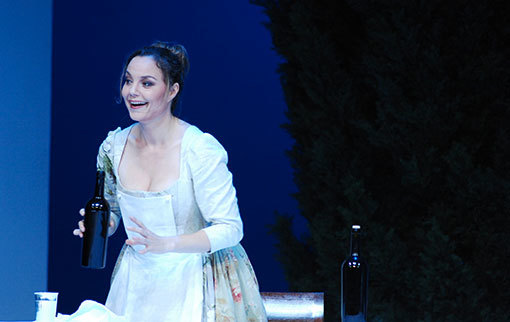Last year, soprano Martina Janková, baritone Tomáš Král and pianist Ivo Kahánek recorded an album of folk songs edited by Leoš Janáček. Visitors of the 2016 Janáček Brno Festival will also have the opportunity to experience its live performance. The only change is that Roman Hoza will perform instead of Tomáš Král at the concert in the Villa Tugendhat. Martina Janková talked about her journey from childhood with folk music to Janáček.
The audience connects your name mainly with old music. What brought you to Leoš Janáček?
As a child I grew up in Frýdlant nad Ostravicí and at the age of four I sang in public concerts of the Kotek family dulcimer band, which is known for its traditional collection of folk poetry that still applies today. In 1906, Leoš Janáček went to see their ancestor Ignác Kotek to Frýdlant and he wrote in his essay Myšlenky cestou: "Only a live song can result in the development of artificial music of the same style... We base our songs on the performance of the Kotek, Mánek, Peterka families...still live musicians, dulcimer players and pipers."
So you grew up with folk music?
Since childhood, I had the opportunity to encounter our "family jewels": beautiful Lachian folk songs and bandmaster Štěpán Kotek gifted me the old first edition of Janáček's collection: Ukvalská poesie v písních (Ukvaldy Poetry in Songs). Later, at the Ostrava Conservatory, I encountered his collection Moravská lidová poesie v písních (Moravian Folk Poetry in Songs) and admired how smartly and very sensitively Janáček reworked our songs for the piano. I have been focusing on song interpretation for over 25 years, I have recorded songs for Dvořák, Musorgsky, Strauss, Schubert, Schumann, Schöck, Mysliveček, Voříšek, Mozart and Haydn, but I "owed" it to our Moravia and Janáček until 2015.
And now you are gradually paying off your debt...
I offered my Janáček programme that I wanted to implement as a dialogue between a man and a woman to Supraphon. In 2015, Ivo Kahánek, baritone Tomáš Král and I released the Ukvalská lidová poesie (Ukvaldy Folk Poetry) and a selection of Moravian poetry. I am extremely happy that American, English, German, Swiss and Austrian specialised publications called our CD a breakthrough because until then they had known Janáček primarily as an opera composer. Here, we had the opportunity to show them the sources with which Janáček worked and which he also often cited in his operas.
Your CD with Janáček's Moravian folk poetry in songs and the DVD Così fan tutte were released last year. What is the difference between singing Mozart and Janáček?
My voice is suitable for classical and baroque operas, oratorios and songs. However, since I work with Janáček based on the original folk sources, I do not sing his work in "opera style" or "stylised" like Brahms' or Schubert's songs and I strive for authenticity that I know from my childhood. The simpler, the better. That does not mean, however, that this music is less demanding. It is a very delicate balance between folk simplicity and singing techniques that I use on other stages.
Is Janáček a suitable author for you?
In my vocal discipline, I can only sing his songs and one of his beautiful and my beloved opera: The Cunning Little Vixen. I sang it as under the baton of Adam Fischer in Europe as well as under the baton of Franz Welser-Möst in the USA. For 2018, we are planning a European tour with the Cunning Little Vixen in beautiful 3D as arranged by Yuval Sharon and his Los Angeles team again with Welser-Möst and his fantastic Cleveland Orchestra.
Why is folk poetry close to your heart? At the Prague Spring Festival, your entire programme consisted of it as set to music not only by Janáček, but also Brahms, Respighi, de Falla...
Based on that, I modified the programme for the Prague Spring Festival and I placed our Lachia and Janáček in the context of other major European composers who also profess love for their countries and their folk music heritage in their versions. De Falla for Spanish folk songs, Respighi for his beloved Tuscany, Canteloube for the French region of Auvergne, and Brahms for German folk songs.
The programme at the Prague Spring Festival is subtitled Tribute to Jarmila Novotná. To whom would you dedicate the concert in the Villa Tugendhat?
The title "Tribute to Jarmila Novotná" refers to a three-year series of the Prague Spring Festival that this festival devotes to recitals of Czech singers known abroad. For example, Adam Plachetka performed in this series last year, my recital is in it this year. It is a misleading title in terms of my programme orientation. In this programme, I confess my own love for our Moravia and Leoš Janáček.































